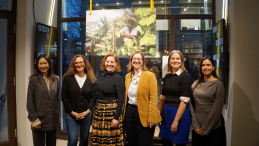On 18 March 2023, UNU-IAS held an online side event of the UN 2023 Water Conference, on the theme Valuing Urban Water in Asia for Achieving Sustainable Development. Focusing on cities in Asia, the session discussed the multi-stakeholder partnerships, technology transfer and localisation, and capacity building that are needed to ensure sustainable use and management of water. During the event UNU-IAS announced the Partnership for Urban Water Sustainability in Asia, a 2-year initiative to develop collaboration between academic institutions and the governments of Member States in Asia on measuring water quality in cities.
In opening remarks, Kensuke Fukushi (Academic Programme Advisor, UNU-IAS; Vice Director, Institute for Future Initiatives, the University of Tokyo) emphasised the importance of balancing the economy, environment, and human well-being, and highlighted the negative effects of water pollution on multiple sectors, including agriculture and human consumption. Dr Fukushi stressed the importance of reliable scientific data and models for promoting resilience and sustainable development.
A keynote presentation by Daniel Karthe (Head of Research Programme, UNU-FLORES) discussed the availability of data on SDG 6 progress in Mongolia. He pointed out that while data sources showed similar levels of access to safe and affordable water, as well as use of safely managed sanitation services and development assistance funds, they showed very different water stress levels. Furthermore, the Mongolian government lacks data for almost all indicators, highlighting the urgent need for reliable data to assess national water challenges.
Nidhi Nagabhatla (Senior Research Fellow, UNU-CRIS) delivered a second keynote on global water security, focusing on governance, transboundary cooperation, financial security, and the linkages between economic, environmental, and water-related issues. She noted that publicly available data such as the World Wildlife Fund water valuation database could be used by the private sector and local communities.
A panel discussion focused on water valuation and quality, as well as the sustainable use of water resources. Panellists emphasised the need to compare the costs of mitigating water quality decline and the costs of recovering water quality as a basis for water valuation. Other key points included the importance of local factors and the value of reused water in advancing circular economy. Socio-hydrology was discussed as an integrated approach to recognising water value for planetary health. Panelists stressed the need for cross-sectoral cooperation, public–private partnerships, regional policy development, mutual learning and research, as well as capacity development and relevant technologies to address water challenges in Asian countries.
An interactive session moderated by Jian Pu (Research Fellow and Academic Associate, UNU-IAS) and Saroj Chapagain (Associate Programme Officer, UNU-FLORES) provided an opportunity for participants to share views on water valuation and strengthen collaboration between Member States and the UN system.
The event was co-organised by UNU-IAS, the UNU Institute on Comparative Regional Integration Studies (UNU-CRIS); the UNU Institute for Integrated Management of Material Fluxes and of Resources (UNU-FLORES); the Ministry of the Environment, Japan (MOEJ); the Institute for Global Environmental Strategies, Japan (IGES); the Institute for Future Initiatives at the University of Tokyo; and Future Earth.



